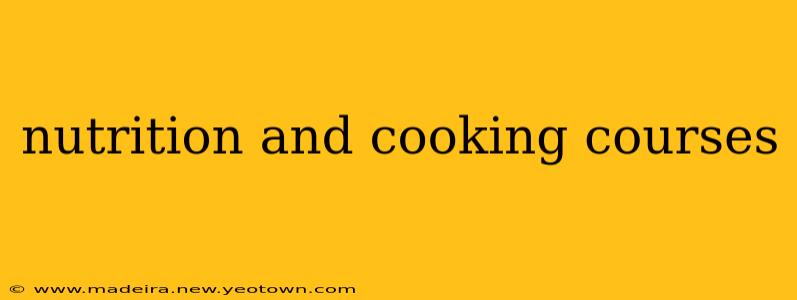The aroma of sizzling garlic, the vibrant colors of fresh vegetables, the satisfying crunch of perfectly roasted nuts – food is more than just sustenance; it's an experience, a celebration, a form of self-care. But navigating the world of healthy eating and skillful cooking can feel overwhelming. That's where nutrition and cooking courses come in – offering a delicious blend of knowledge and practical skills to transform your relationship with food. This guide will help you find the perfect course to match your culinary aspirations and nutritional goals.
What are the benefits of taking nutrition and cooking courses?
Learning to cook nutritious meals isn't just about weight management; it's about fostering a healthier lifestyle. Courses empower you to take control of your diet, understand the nutritional value of ingredients, and experiment with flavors to create meals you'll actually enjoy. Beyond the immediate health benefits, these courses offer a fantastic opportunity for personal growth, boosting confidence in the kitchen and expanding your culinary repertoire.
What different types of nutrition and cooking courses are available?
The culinary landscape is vast, and so are the course options. You'll find everything from beginner-friendly workshops to intensive professional programs. Here are some common types:
-
Beginner cooking classes: These are perfect for individuals with little to no cooking experience. They often focus on foundational techniques like knife skills, basic cooking methods, and simple, healthy recipes.
-
Advanced cooking classes: These classes cater to those with some cooking experience, delving into more complex techniques and cuisines. Think advanced knife skills, mastering specific cooking methods (like sous vide or fermentation), and exploring regional specialties.
-
Nutrition courses: Some courses prioritize the nutritional aspects of food, focusing on macronutrients, micronutrients, dietary guidelines, and meal planning. These courses often incorporate practical cooking elements.
-
Specialized courses: Think vegan cooking, vegetarian cooking, gluten-free cooking, baking classes, or courses focused on specific cuisines (e.g., Italian, French, Indian). The possibilities are endless!
-
Online vs. in-person courses: The convenience of online courses is undeniable, allowing you to learn at your own pace and from the comfort of your home. In-person courses offer the benefit of hands-on learning, instructor feedback, and the chance to connect with other food enthusiasts.
How do I choose the right nutrition and cooking course for me?
Selecting the perfect course involves a few key considerations:
-
Your current skill level: Are you a complete beginner or do you already possess some cooking skills? Choose a course that matches your existing abilities.
-
Your dietary needs and preferences: Are you vegetarian, vegan, or following a specific diet? Look for courses that cater to your dietary requirements.
-
Your learning style: Do you prefer hands-on learning or a more theoretical approach? Choose a course that aligns with your preferred learning style.
-
Course structure and format: Consider whether you prefer online or in-person classes, the duration of the course, and the scheduling options.
-
Instructor qualifications and experience: Look for instructors with relevant credentials and experience in nutrition and cooking.
What are some common topics covered in nutrition and cooking courses?
Most courses will cover a variety of topics, including:
- Basic cooking techniques: Knife skills, sautéing, roasting, boiling, steaming, etc.
- Understanding nutrition labels: Learning to decipher nutritional information on packaged foods.
- Meal planning and preparation: Strategies for efficient and healthy meal planning.
- Healthy substitutions: Learning to swap unhealthy ingredients for healthier alternatives.
- Recipe development: Creating your own healthy and delicious recipes.
Are there any certifications or qualifications offered by nutrition and cooking courses?
Some courses offer certifications upon completion, which can be beneficial if you're aiming for a career in the food industry. However, many courses focus on practical skills and knowledge without providing formal certifications.
Where can I find nutrition and cooking courses?
Numerous organizations and institutions offer nutrition and cooking courses, including:
- Community colleges and vocational schools: These often offer affordable and accessible options.
- Cooking schools and culinary institutes: These provide more intensive training for aspiring chefs and food professionals.
- Online learning platforms: Many online platforms offer a wide variety of nutrition and cooking courses, often at a fraction of the cost of in-person classes.
Finding the perfect nutrition and cooking course is an exciting journey. Take your time, explore your options, and get ready to transform your culinary skills and elevate your health! Happy cooking!

